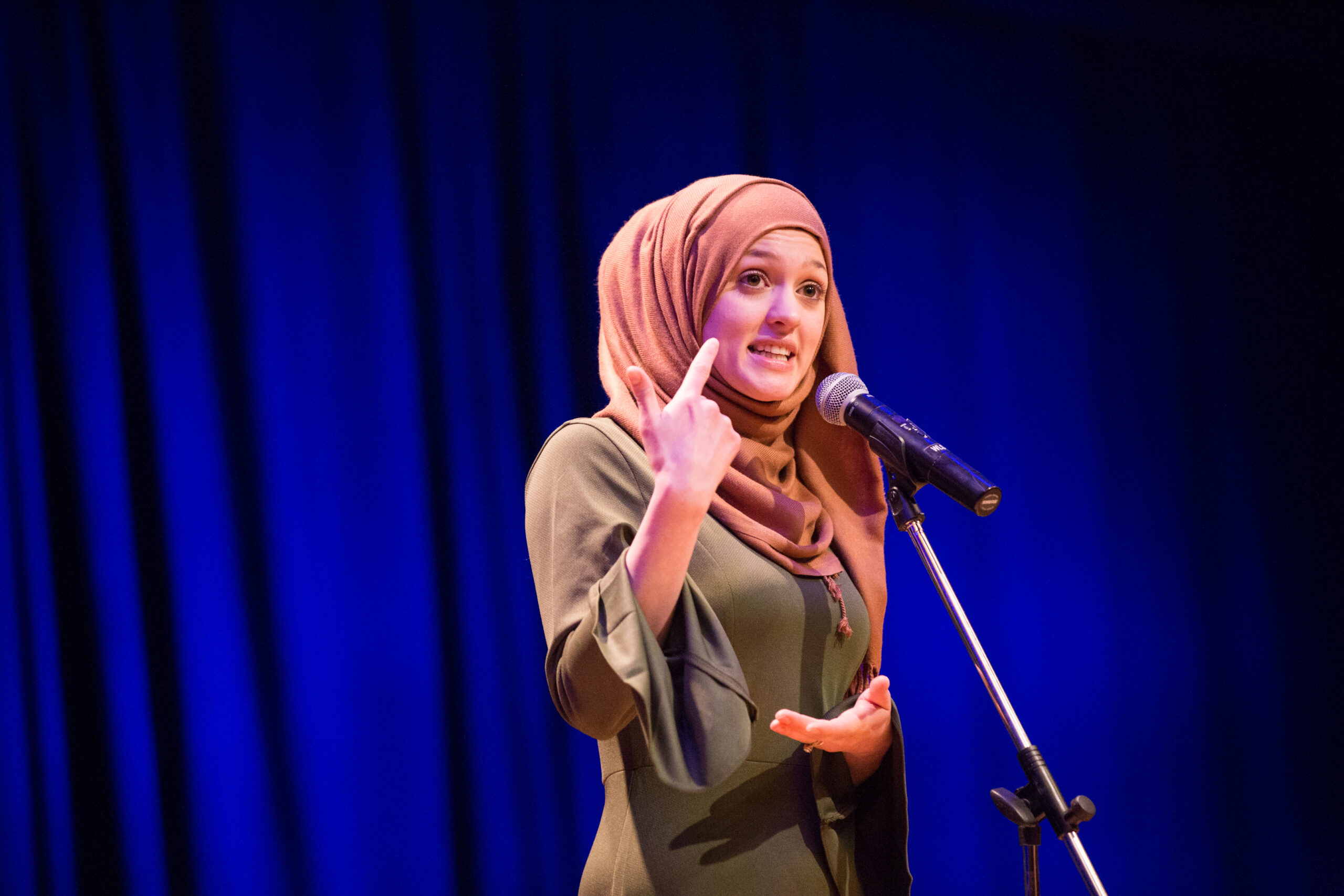Amal Kassir: activist, empathist, poet
April 13, 2018
 Ann Basu
Ann BasuThere are activists, there are storytellers and there’s Amal Kassir. Unapologetic in her poignant dissections of humanity, the Denver-born, Syrian-American spoken-word poet calls herself an “empathist.” Her Thursday night performance in Kresge Auditorium, sponsored by the Muslim Students Association, presented personal recounts on war, race and religion.
Kassir’s name stands for “hope” in Arabic, her Syrian father’s native tongue. Exposed to the strife of war and poverty from a young age, Kassir has always had a strong impulse to express her indignation and assert agency of her own.
“Not knowing how to convince someone [of] the sanctity of human life, it renders me very, very powerless. And the reason why I get up on these stages is because it gives me power, it gives me ownership to my voice,” said Kassir. “I get to speak and claim my territory.”
Kassir speaks about individuals deeply affected by human injustice and systematic abuses of power. Her poems are made particularly powerful through their palpable depictions of pain and loss, often centered on the relationship between mother and child. She opened with a heart-wrenching portrayal of a mass school shooting.
“We are standing before your window holding our kids, dripping with blood, praying you’ll at least point your cameras at us. You lock your doors at night, but we’re all afraid of this world … we’re afraid like all mothers … We will never forget the lives we lost, we will teach our children to pray for your children. We will teach them to say, may we bury the guns like we bury the children, say Amen.”
With this depiction of grief, Kassir draws a parallel between the footage of Syrian mothers hugging their kids in tears and the almost identical ones seen from Parkland, Florida. The victory of life, according to Kassir, is the most moving universal motif.
“There’s a verse by Brother Ali … and he says, ‘Can you tell me what language you laugh in? The human reactions, the smiles and cries. What language are the tears when they’re falling from your eyes?’” added Kassir.
Her work is also deeply rooted in her history and first-hand stories from members of her family. Outspoken about the tragedies of war in Syria and frustration with the refugee crisis, Kassir seeks to communicate the unimaginable weight of human tragedy.
“At the end of the day, my dad lost his sister and we lost 11 members of our family … When you’re from a war zone you become a professional at saying goodbye,” she said. “This is the case not just for a place like Syria … We’re put in a position where we have to redefine what happiness and sadness mean. The fact that my family lost their families—you know what that meant? They didn’t have to live in that hell on earth.”
Realizing the labels easily ascribed to her because of her appearance, Kassir challenges connotations of Islamophobia and speaks about her religion with pride and appreciation.
“If you want to know where Islamic feminism begins, it is this verse right here: ‘Heaven is under your mother’s feet’ … It’s believed at the epicenter of our faith, of our upbringing, of our values.”
Students appreciated her distinct perspective and remarked on the ways in which Kassir explored the enduring strength of humanity.
“I think her perspective on humanity and her discussion of her personal turmoil and journey, in both faith and in her own role in portraying these issues in society, was really illuminating,” said Emma Greenberg ’18. “She talks about devastating and horrific things with a very interesting lens of both her role as an American, her role as an activist and her role as a human being.”
Indeed, what makes Kassir stand apart is her understanding of love and empathy.
“I strongly believe that the opposite of peace is not war. The opposite of love is not hate—it’s apathy,” said Kassir. “It’s like the heart has its own cognition.”

Comments
Before submitting a comment, please review our comment policy. Some key points from the policy: